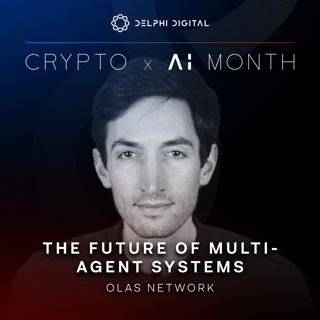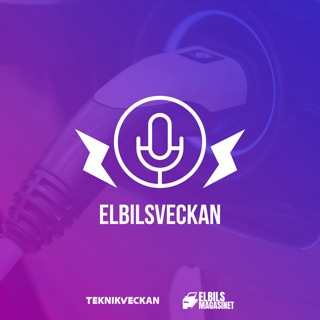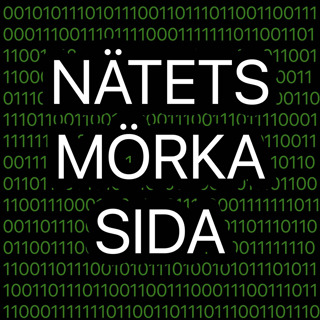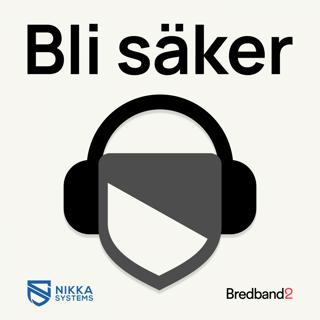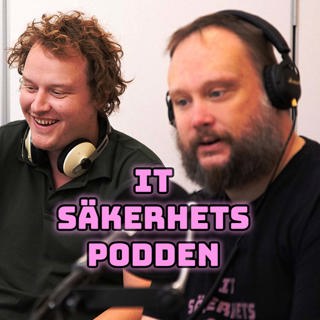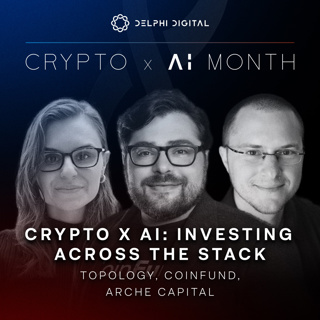
Crypto x AI: Investing Across The Stack | Crypto x AI Event
Can crypto unlock AI's full potential? Top investors debate the intersection of crypto and AI, exploring opportunities and challenges in decentralized AI development. This panel discussion, hosted by José Maria Macedo from Delphi Digital, features: - William Wolf (Arch Capital) - Jake Brukhman (CoinFund) - Casey Caruso (Topology) Key topics include: - The role of open-source models in crypto AI development - Unique advantages blockchain brings to AI infrastructure - Decentralized approaches to compute, training, and inference - The future of data ownership and aggregation - Potential for AI agents to utilize crypto payment rails - Challenges and opportunities in various crypto AI verticals This in-depth conversation provides valuable insights into the mindset of investors within the crypto x AI space and explores the potential for blockchain technology to reshape the AI landscape. Watch more sessions from Crypto x AI Month here: https://delphidigital.io/crypto-ai --- Crypto x AI Month is the largest virtual event dedicated to the intersection of crypto and AI, featuring 40+ top builders, investors, and practitioners. Over the course of three weeks, this event brings together panels, debates, and discussions with the brightest minds in the space, presented by Delphi Digital. Crypto x AI Month is free and open to everyone thanks to the support from our sponsors: https://olas.network/ https://venice.ai/ https://near.org/ https://mira.foundation/ https://www.theoriq.ai/ --- Follow the Speakers: - José Macedo on Twitter/X ► https://x.com/zemariamacedo - Casey Caruso on Twitter/X ► https://x.com/caseykcaruso - William Wolf on Twitter/X ► https://x.com/throughnothing - Jake Brukhman on Twitter/X ► https://x.com/jbrukh --- Chapters 00:00 Introduction and Sponsor Acknowledgments 00:52 Panel Introduction and Topic Overview 04:29 Responding to AI and Crypto Skepticism 11:56 Dependence on Open Source AI Models 18:10 Crypto's Unique Value Proposition in AI 25:07 Regulatory Challenges and KYC for AI 31:35 The Future of AI Models and Compute 38:29 Most Interesting Areas in Crypto AI 48:02 Decentralized Inference and Verifiability 52:27 The Value and Future of Data in AI 59:53 AI Agents and Multi-Agent Systems 1:06:22 Product-Market Fit in Crypto AI 1:12:13 Closing Thoughts and Future Predictions Disclaimer All statements and/or opinions expressed in this interview are the personal opinions and responsibility of the respective guests, who may personally hold material positions in companies or assets mentioned or discussed. The content does not necessarily reflect the opinion of Delphi Citadel Partners, LLC or its affiliates (collectively, “Delphi Ventures”), which makes no representations or warranties of any kind in connection with the contained subject matter. Delphi Ventures may hold investments in assets or protocols mentioned or discussed in this interview. This content is provided for informational purposes only and should not be misconstrued for investment advice or as a recommendation to purchase or sell any token or to use any protocol.
21 Okt 20241h 16min
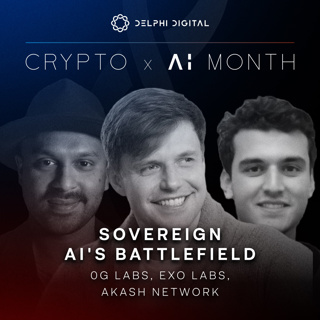
Sovereign AI's Battlefield: Compute, Storage, & Running On The Edge | Crypto x AI Event
Dive deep into the critical infrastructure layer powering the future of decentralized AI. Pondering Durian (Delphi) hosts a panel of leading experts building the next generation of decentralized compute, storage, and tooling: ►Greg Osuri, Founder of Akash, the world's first decentralized cloud platform ►Michael Heinrich, Co-Founder & CEO of Zero G Labs, creators of the first decentralized AI operating system ►Mohamed Baioumy, Co-Founder of ExoLabs, enabling private, user-owned AI models This episode provides an inside look at the technologies, tradeoffs, and possibilities in decentralized AI infrastructure. We examine the challenges and opportunities in building user-controlled, privacy-preserving AI systems on decentralized clouds and Web3 tech stacks. Our panel explores the cutting edge of decentralized compute, storage, and tooling, and debates what's needed for open-source, decentralized development to compete with Big Tech's AI infrastructure. Key Questions: - Where is demand coming from for decentralized infrastructure and how does it compete with hyperscalers? - What are the key innovations enabling performant decentralized storage and retrieval for AI workloads? - How do privacy, latency, and cost tradeoffs impact what AI can be done on-device vs in decentralized clouds? - What breakthroughs are needed for decentralized AI training to catch up to centralized approaches? - How does an open source ethos and permissionless innovation accelerate progress in decentralized infrastructure? Watch more sessions from Crypto x AI Month here: https://delphidigital.io/crypto-ai --- Crypto x AI Month is the largest virtual event dedicated to the intersection of crypto and AI, featuring 40+ top builders, investors, and practitioners. Over the course of three weeks, this event brings together panels, debates, and discussions with the brightest minds in the space, presented by Delphi Digital. Crypto x AI Month is free and open to everyone thanks to the support from our sponsors: https://olas.network/ https://venice.ai/ https://near.org/ https://mira.foundation/ https://www.theoriq.ai/ --- Follow the Speakers: - Pondering Durian on Twitter/X ► https://x.com/ponderingdurian - Michael Heinrich on Twitter/X ► https://x.com/mheinrich - Mohamed Baioumy on Twitter/X ► https://x.com/mo_baioumy - Greg Osuri on Twitter/X ► https://x.com/gregosuri --- Chapters 00:00 Introduction to Decentralized Infrastructure 04:04 Demand and Competition in Decentralized Computing 10:49 Innovations in Decentralized Storage Solutions 13:56 Local vs Cloud Computing: Trade-offs and Use Cases 18:35 Project Superpowers: Unique Value Propositions 25:11 Overrated vs Underrated: Quickfire Round 32:52 Decentralized Training: Future Perspectives 37:49 Vision and Success Metrics for the Future Disclaimer All statements and/or opinions expressed in this interview are the personal opinions and responsibility of the respective guests, who may personally hold material positions in companies or assets mentioned or discussed. The content does not necessarily reflect the opinion of Delphi Research, which makes no representations or warranties of any kind in connection with the contained subject matter. This content is provided for informational purposes only and should not be misconstrued for investment advice or as a recommendation to purchase or sell any token or to use any protocol.
18 Okt 202445min
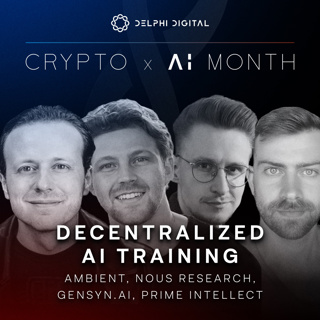
Decentralized AI Training: Can It Dismantle Centralized Powerhouses? | Crypto x AI Event
Top experts debate the potential for open-source, community-driven AI to challenge tech giants and explore the unique advantages of decentralized approaches. Key topics include: ►Feasibility of competitive open-source AI models ►Advantages of decentralized training approaches ►Challenges in compute resources and talent acquisition ►The role of crypto incentives in AI development ►Balancing open-source principles with value capture ►Governance challenges for decentralized AI projects ►Potential risks and obstacles for decentralized AI This engaging debate bridges the gap between decentralized infrastructure, AI development, and crypto economic models. Gain insights from industry leaders on how projects like Nous, Gensyn, Ambient, and Prime Intellect are working to democratize AI and create more efficient, trustless systems. Watch more sessions from Crypto x AI Month here: https://delphidigital.io/crypto-ai --- Crypto x AI Month is the largest virtual event dedicated to the intersection of crypto and AI, featuring 40+ top builders, investors, and practitioners. Over the course of three weeks, this event brings together panels, debates, and discussions with the brightest minds in the space, presented by Delphi Digital. Crypto x AI Month is free and open to everyone thanks to the support from our sponsors: https://olas.network/ https://venice.ai/ https://near.org/ https://mira.foundation/ https://www.theoriq.ai/ --- Follow the Speakers: - Tommy Shaughnessy on Twitter/X ► https://x.com/shaughnessy119 - Travis Good on Twitter/X ► https://x.com/IridiumEagle - Dillon Rolnick on Twitter/X ► https://x.com/DillonRolnick - Johannes Hagemann on Twitter/X ► https://x.com/johannes_hage - Ben Fielding on Twitter/X ► https://x.com/fenbielding --- Chapters 00:00 Introduction to Decentralized vs Centralized AI Training 02:46 The Viability of Decentralized AI Models 05:57 Technical and Economic Challenges in AI Training 09:09 The Future of Specialized vs Generalist AI Models 12:01 The Role of Regulatory Environment in AI Development 14:56 The Importance of Model Maintenance and Updates 18:06 The Economics of Decentralized AI 20:56 Talent and Collaboration in Open Source AI 23:58 The Efficiency of Decentralized Systems 27:04 The Political Implications of AI Control 30:12 Recent Breakthroughs in Decentralized Training 33:04 The North Star of Open Source AI 35:53 The Intersection of Open Source AI and Crypto 38:59 The Future of Competition in AI Markets 46:22 Decentralization and Competition in the Market 49:34 The Evolution of User Interfaces and Trustlessness 52:31 The Convergence of AI and Crypto 56:30 The Role of Agents in the Economy 01:01:27 Open Source AI and Value Capture 01:06:23 Governance Challenges in Decentralized Systems 01:23:24 Skepticism and Future Risks in AI and Crypto Disclaimer All statements and/or opinions expressed in this interview are the personal opinions and responsibility of the respective guests, who may personally hold material positions in companies or assets mentioned or discussed. The content does not necessarily reflect the opinion of Delphi Citadel Partners, LLC or its affiliates (collectively, “Delphi Ventures”), which makes no representations or warranties of any kind in connection with the contained subject matter. Delphi Ventures may hold investments in assets or protocols mentioned or discussed in this interview. This content is provided for informational purposes only and should not be misconstrued for investment advice or as a recommendation to purchase or sell any token or to use any protocol.
17 Okt 20241h 32min
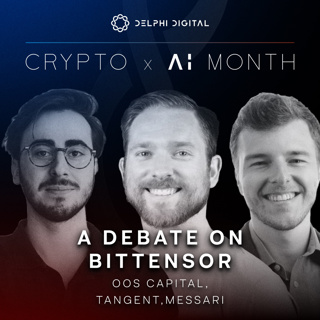
A Debate on Bittensor | Crypto x AI Event
Join us for an in-depth panel discussion on BitTensor and its native token, TAO, featuring top analysts in the crypto and AI space. Michael Rinko from Delphi Digital hosts Nick Hotz (Tangent), Sami Kassab (OSS Capital), and Seth Bloomberg (Messari) as they dive into the intricacies of BitTensor's decentralized AI network. This comprehensive conversation covers: ► BitTensor's core mission and how it aims to decentralize AI development ► The network's structure, including subnets, miners, and validators ► TAO tokenomics and the upcoming Dynamic TAO upgrade ► Challenges and potential solutions in incentive mechanism design ► Comparisons with traditional AI development models ► The future of BitTensor and exciting milestones to watch Watch more sessions from Crypto x AI Month here: https://delphidigital.io/crypto-ai --- Crypto x AI Month is the largest virtual event dedicated to the intersection of crypto and AI, featuring 40+ top builders, investors, and practitioners. Over the course of three weeks, this event brings together panels, debates, and discussions with the brightest minds in the space, presented by Delphi Digital. Crypto x AI Month is free and open to everyone thanks to the support from our sponsors: https://olas.network/ https://venice.ai/ https://near.org/ https://mira.foundation/ https://www.theoriq.ai/ --- Follow the Speakers: - Michael Rinko on Twitter/X ► https://x.com/mrink0 - Nick Hotz on Twitter/X ► https://x.com/Nick_Hotz - Sami Kassab on Twitter/X ► https://x.com/Old_Samster - Seth Bloomberg on Twitter/X ► https://x.com/bloomberg_seth --- Chapters 00:00 The Genesis of BitTensor: A Decentralized AI Solution 07:00 Understanding the Incentive Mechanism in BitTensor 13:14 Interfacing BitTensor with Real-World Applications 19:29 The Role of Validators in BitTensor 22:50 TAO: The Utility Token of BitTensor 39:26 Understanding TAO Emissions and Their Impact 45:11 The Role of Validators and Emission Allocation 52:43 First Mover Advantage in Decentralized AI 01:00:10 The Challenge of Retaining Talent in BitTensor 01:10:55 Future Prospects and Exciting Developments in BitTensor Disclaimer All statements and/or opinions expressed in this interview are the personal opinions and responsibility of the respective guests, who may personally hold material positions in companies or assets mentioned or discussed. The content does not necessarily reflect the opinion of Delphi Research, which makes no representations or warranties of any kind in connection with the contained subject matter. This content is provided for informational purposes only and should not be misconstrued for investment advice or as a recommendation to purchase or sell any token or to use any protocol.
16 Okt 20241h 17min
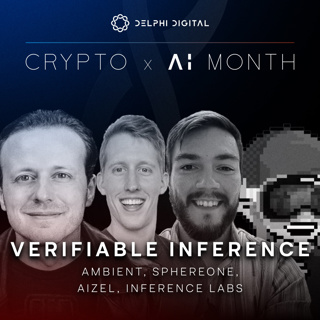
Verifiable Inference: Don't Trust, Verify | Crypto x AI Event
In this engaging debate for Crypto x AI Month, join Luke Saunders as he moderates a conversation on Verifiable Inference—a critical technology that ensures trustless AI by verifying the correctness of outputs without revealing internal workings. He is joined by leading founders from the crypto AI space, including Colin Gagich of Inference Labs, Ryan McNutt of SphereOne, Jeremy from Aizel Network, and Travis Good of Ambient, to explore: ► What verifiable inference is and why it's essential in the age of AI ► How decentralized models can offer solutions to centralized AI control ► Real-world use cases of verifiable inference across blockchain and AI applications This panel digs into the technical approaches—from ZK proofs to trusted execution environments (TEEs)—and discusses how the future of AI and crypto requires trustless verification to ensure security, transparency, and privacy. Watch more sessions from Crypto x AI Month here: https://delphidigital.io/crypto-ai --- Crypto x AI Month is the largest virtual event dedicated to the intersection of crypto and AI, featuring 40+ top builders, investors, and practitioners. Over the course of three weeks, this event brings together panels, debates, and discussions with the brightest minds in the space, presented by Delphi Digital. Crypto x AI Month is free and open to everyone thanks to the support from our sponsors: https://olas.network/ https://venice.ai/ https://near.org/ https://mira.foundation/ https://www.theoriq.ai/ --- Follow the Speakers: - Luke Saunders on Twitter/X ► https://x.com/lukedelphi - Travis Good on Twitter/X ► https://x.com/IridiumEagle - Jeremy on Twitter/X ► https://x.com/immorriv - Colin Gagich on Twitter/X ► https://x.com/colingagich - Travis Good on Twitter/X ► https://x.com/ryanmcnutty33 --- Chapters 00:00 Introduction to Verifiable Inference 03:46 Defining Verifiable Inference 05:13 Use Cases for Verifiable Inference 10:01 Real-World Applications and Innovations 16:38 Different Approaches to Verification 24:18 Exploring Zero-Knowledge Proofs 28:08 Proof of Logics and Its Implications 34:02 Multi-Agent Systems and Transaction Verification 37:46 Challenges in Optimistic Approaches 41:36 Determinism and Model Reproducibility 45:30 The Balance of Open and Closed Source Models 50:25 The Future of Edge Computing and Inference 57:49 Decentralization and Government Control of AI Disclaimer All statements and/or opinions expressed in this interview are the personal opinions and responsibility of the respective guests, who may personally hold material positions in companies or assets mentioned or discussed. The content does not necessarily reflect the opinion of Delphi Citadel Partners, LLC or its affiliates (collectively, “Delphi Ventures”), which makes no representations or warranties of any kind in connection with the contained subject matter. Delphi Ventures may hold investments in assets or protocols mentioned or discussed in this interview. This content is provided for informational purposes only and should not be misconstrued for investment advice or as a recommendation to purchase or sell any token or to use any protocol.
15 Okt 20241h 6min
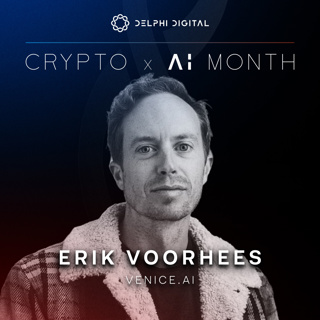
Erik Voorhees: The Battle for Human Freedom in the Post-Human World | Crypto x AI Event
Join Tommy Shaughnessy as he kicks off Crypto x AI Month by hosting Erik Voorhees, founder of Venice.ai, Satoshi Dice, and ShapeShift. In this thought-provoking discussion, they explore the intersection of AI and decentralized systems, delving into: ► The clash between centralized AI and decentralized alternatives ► The role of crypto in enabling open, permissionless systems ► How AI could impact individual freedom, human rights, and consciousness in the future This conversation opens a larger debate on the potential risks of centralized AI models and the importance of offering decentralized, open-source alternatives. “I think...one of the biggest dangers to humanity really, is if we allow ourselves to be convinced that open source AI is too dangerous, and it’s outlawed or heavily restricted in some way, then we're in a bad spot.” — Erik Voorhees Watch more sessions from Crypto x AI Month here: https://delphidigital.io/crypto-ai --- Crypto x AI Month is the largest virtual event dedicated to the intersection of crypto and AI, featuring 40+ top builders, investors, and practitioners. Over the course of three weeks, this event brings together panels, debates, and discussions with the brightest minds in the space, presented by Delphi Digital. Crypto x AI Month is free and open to everyone thanks to the support from our sponsors: https://olas.network/ https://venice.ai/ https://near.org/ https://mira.foundation/ https://www.theoriq.ai/ --- Follow the Speakers: - Tommy Shaughnessy on Twitter/X ► https://x.com/shaughnessy119 - Erik Voorhees on Twitter/X ► https://x.com/erikvoorhees --- Chapters 00:00 Introduction to the Conference and Eric's Role 00:45 AI: Friend or Foe to Individual Freedom? 03:10 Building Alternatives: The Case for Venice 06:02 The Importance of Competing Viewpoints in AI 08:53 Open Source vs. Centralized AI: A Competitive Landscape 11:48 The Future of AI and Crypto Integration 15:09 Bridging the Gap: Convincing AI Experts to Embrace Crypto 18:52 Governance in AI: Who Should Control the Models? 22:12 The Dangers of Centralized Control in AI 24:10 Maintaining Skepticism Towards Authority 26:58 The Role of Truth in AI Development 28:49 The Rise of Permissionless AI 35:04 Privacy and Data Security in AI 37:03 The Future of Governance and Mobility 41:20 Utopian Visions: AI and Human Progress 43:46 Decentralized Training: The Key to AI Freedom 55:16 The Need for Leadership in Open Source AI Disclaimer All statements and/or opinions expressed in this interview are the personal opinions and responsibility of the respective guests, who may personally hold material positions in companies or assets mentioned or discussed. The content does not necessarily reflect the opinion of Delphi Citadel Partners, LLC or its affiliates (collectively, “Delphi Ventures”), which makes no representations or warranties of any kind in connection with the contained subject matter. Delphi Ventures may hold investments in assets or protocols mentioned or discussed in this interview. This content is provided for informational purposes only and should not be misconstrued for investment advice or as a recommendation to purchase or sell any token or to use any protocol.
14 Okt 202456min
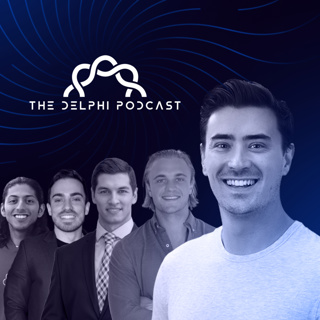
Proph3t: Exploring MetaDAO and the Future of Markets-Driven Governance
In this episode, Michael and Proph3t discuss the innovative concept of MetaDAO, focusing on the efficiency of prediction markets and their role in decision-making. They explore the skepticism surrounding market efficacy, the novel governance model of futarchy, and the challenges of building a new platform in the crypto space. The discussion also highlights strategies for engaging users in prediction markets and the potential for future developments in decentralized governance. In this conversation, the speaker discusses the design of MetaDAO, focusing on creating user-friendly interfaces for both power users and casual participants. They explore the challenges of selecting effective metrics for futarchy, addressing the time value of money in proposals, and the potential for composability in prediction markets. The discussion also touches on the advantages of futarchy over traditional DAOs, the role of AI in decision-making, and the importance of minority protection within the governance model. The speaker emphasizes the need for growth and development in MetaDAO, aiming to enhance user experience and expand its application across various DAOs. Proph3t's Twitter: https://x.com/metaproph3t Chapters 00:00 Introduction to MetaDAO and Market Efficiency 06:12 Beliefs and Skepticism in Market Efficacy 12:56 Futarchy: A New Governance Model 19:43 Building MetaDAO: Challenges and Opportunities 26:55 Engaging Users in Prediction Markets 31:14 Designing for Diverse Users 34:08 Metrics for Futarchy 36:34 Addressing Time Value of Money in Proposals 39:53 Composability in Prediction Markets 42:19 Futarchy vs Traditional DAOs 46:42 Long-Term Strategic Decisions in Governance 52:24 AI and Futarchy: A New Frontier 56:48 Minority Protection in Futarchy 01:00:08 Future Growth and Development of MetaDAO Disclosures This podcast is strictly informational and educational and is not investment advice or a solicitation to buy or sell any tokens or securities or to make any financial decisions. Do not trade or invest in any project, tokens, or securities based upon this podcast episode. The host and members at Delphi Ventures may personally own tokens or art that are mentioned on the podcast. Our current show features paid sponsorships which may be featured at the start, middle, and/or the end of the episode. These sponsorships are for informational purposes only and are not a solicitation to use any product, service or token.
11 Okt 20241h 2min

Kain Warwick: Infinex, the Future of DeFi, and ETH vs SOL
In this episode of the Delphi podcast, co-host José Maria Macedo speaks with Kain Warwick, co-founder of Synthetix and Infinex. They discuss Kain's journey in the crypto space, the evolution of Synthetix, and the challenges faced by decentralized finance (DeFi). The conversation delves into user experience innovations, the competition in the DeFi space, and the importance of governance. Kane shares insights on the future of ICOs and the need for better governance models in the crypto ecosystem. Kain's Twitter: https://x.com/kaiynne Chapters 00:00 Introduction to Kain Warrick and Synthetix 03:23 Kain's Journey in the Crypto Space 06:59 The Evolution of Synthetix and Yield Farming 10:07 Understanding User Needs in DeFi 12:36 Infinex: Bridging Centralized and Decentralized Experiences 15:12 Challenges of Centralized Exchanges 17:53 User Experience Innovations in Infinex 20:19 Cross-Chain Integration and Aggregation 23:07 Building a Stateful Application for DeFi 26:26 Competition in the DeFi Space 29:12 Long Tail Opportunities in DeFi 34:54 The ETH vs. Solana Debate 37:56 Governance in DeFi: Challenges and Innovations 47:23 The Future of ICOs and Token Distribution 55:43 Governance Models and Their Evolution Disclosures This podcast is strictly informational and educational and is not investment advice or a solicitation to buy or sell any tokens or securities or to make any financial decisions. Do not trade or invest in any project, tokens, or securities based upon this podcast episode. The host and members at Delphi Ventures may personally own tokens or art that are mentioned on the podcast. Our current show features paid sponsorships which may be featured at the start, middle, and/or the end of the episode. These sponsorships are for informational purposes only and are not a solicitation to use any product, service or token.
23 Sep 20241h 1min
